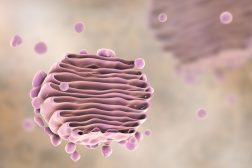Definition
noun, plural: vesicles
(general) A small sac or cyst containing fluid or gas
(cell biology) A bubble-like membranous structure that stores and transports cellular products, and digests metabolic wastes within the cell; an intracellular membranous sac that is separated from the cytosol by at least one lipid bilayer
(physiology) A membranous pouch within an axon terminal that stores and releases neurotransmitter
(embryology)
(pathology) Small fluid-filled lesion or blister formed in or beneath the skin
(mycology) In fungi, a bubble-like sac produced by zoosporangium, and from where zoospores mature and are eventually released
(phycology) A floating gas-filled bubble or bladder-like structure in algal cell
Supplement
In general, the term vesicle refers to a small sac or cyst that contains fluid or gas. In cell biology, vesicle refers to the bubble-like membranous structure that stores and transports cellular products, and digests metabolic wastes within the cell. The cell forms vesicles during exocytosis, endocytosis, and intracellular transport. Vesicles may be produced artificially and are referred to as lyposomes. Some of their functions are associated with metabolism, transport, storage of food and enzymes, and buoyancy. There are different forms of vesicles: vacuoles, lysosomes, transport vesicles, secretory vesicles (e.g. synaptic vesicles), extracellular vesicles (e.g. exosomes, microvesicle, etc.), and gas vesicles.
Word origin: Latin vēsīcula, diminutive of vēsīca, bladder, blister
See also:
- organelle
Related term(s):





